Brendan Shanahan joined Overdrive on TSN1050 moments ago to reflect on the season and look ahead to the offseason. Transcript below.
You just wrapped up a season that obviously wasn’t a successful one necessarily in the standings. You guys finished 30th place. But compared to what happened a year ago, it’s polar opposite in terms of the tabloids, in terms of the circus. Last year, it was crazy, and you came out at the end of the year around this time and said things clearly had to change. A lot of things have changed – the coaching staff, the front office. When that year came to an end, what did you promise yourself that you wouldn’t allow to happen again this season?
Shanahan: That’s a fair question. One of the things I remember saying was that you have to enjoy being here if you want to play here. It goes for working here. I think that was the one thing that I really wanted to do going forward after that press conference at the end of last season. I wanted to always sort of have the ability to be honest and not look at a player or not look at a move and say, “this isn’t who I want us to be. “ I really, I guess, wanted the Maple Leafs to begin reflecting what I felt the team deserved and what the city deserved and what every alumni that ever played here deserved. I guess it’s a bit of a broad answer, but I wanted people to be able to be, at the very least, proud of the effort and not make any more excuses or hide anything. That was about really becoming more transparent with who we are.
It still must be a different experience, with so much winning for yourself, the coach, Lou, and the positivity coming out of the season, and yet the team is 30th.
Shanahan: I would say that, obviously, when you’re sitting there and you don’t have a GM at the end of the season and don’t have a head coach at the end of the season, at the back of your mind you dare to sort of hope to get certain people… although we weren’t sure if Mike was going to be available because he was still coaching. We didn’t know that Lou Lamoriello would be available. I just feel it was a very fortunate summer for the Maple Leafs organization.
Mike Babcock – he’s been more front and center this year, being the coach. He’s out there speaking with the media everyday. You see him constantly. He’s not used to this. In Detroit, he went to the playoffs every year. When he went to Anaheim, outside of the first year, he was constantly going to the playoffs. Were you concerned at all with how he would handle this kind of a season; this much losing?
Shanahan: He certainly is a very competitive guy. I remember one of the first conversations I had with him, where he basically asked, “what do you have? What’s in the system? Who’s coming?” He started asking about certain players. I didn’t lie to him. I didn’t pull any punches. I remember walking into the kitchen and saying to my wife, “I think I just blew it, because I told him the truth.” He is such a competitive guy and he doesn’t like to lose, and I knew we were in a position where we weren’t looking for a quick fix, a temporary fix. We wanted to really build this the right way so that when we do arrive, we stay for a long time. He sort of followed that up with another conversation and seemed interested. It took a while. I guess it’s a long way of saying that, once the season started, I knew he was in. He wasn’t kidding around when he said, “there is going to be pain.” He meant that was going to be pain for him as well. When you get behind the bench, it doesn’t matter what you think or what your plan is for the future or how many years you think something will take. When you get behind the bench, you want to win. And that’s how he is.
He was really optimistic yesterday. He has been, really, throughout the season, but in the last couple of weeks starting to look forward to the offseason and into next year. Yesterday, you spoke with the media and you said you’re actually a little further ahead than where you thought you might be. In which ways?
Shanahan: When Lou and Mike both came on – so if we go back a year – I would say that you don’t know how they’re going to respond to some of the prospects we already have. When I say the prospects we already have, [I mean] who we had at that time – the William Nylanders, the Connor Browns, the Brendan Leipsics, the Rinat Valievs. You’re not sure how they’re going to respond to some of the current players we have. Also at that time, you don’t even have a Mark Hunter draft pool. I think we all sort of looked at each other around Christmas time, when we’ve seen what the Marlies players are doing and we’ve seen what some of our prospects that Mark just drafted were doing and we’ve seen a great response from our team. I think all it really means is that the players we have projected as prospects are actually prospects. Mark and Sheldon Keefe have done a great job of even cultivating role players or potential role players within the organization. Going back to when I was having this conversation with Mike, we didn’t have a Soshnikov, we didn’t have a Hyman, we didn’t have some of the guys now that appear to have a place in the future with the Maple Leafs.
You wait for the draft lottery now. How does the outcome of the draft lottery potentially affect what you do this offseason? In other words, if you pick first, does it send you down one wrung? If you end up fourth, does it send you down a different one?
Shanahan: A little bit. Maybe not extremely different directions, but it might change the direction a little bit. But I wouldn’t say complete polar opposites.
Do you like the way the lottery is set up, or would you prefer 30th means you get first overall?
Shanahan: My timing is terrible! I go get a coach and a GM the one year that there’s actually compensation for doing such a thing. And then our first year we are in 30th since Wendel Clark came to town is the year that you could actually finish with the fourth pick. It’s horrible timing on my part.
You can’t control it, right? But you must be thinking about it all the time.
Shanahan: I try not to think about things that aren’t in my control. I think that there will be a good player there at four; whoever picks at four. It’s better than a pretty good draft. There’s some players. Obviously everyone wants to pick as high as possible, but we know that the odds aren’t great for that. It is what it is. It’s the same way as when we went after Mike and went after Lou and we were giving up compensation to do so. It’s well worth it. The rules of the draft are the rules of the draft. I don’t see it really changing any time soon. I don’t think it’s going back to the way it was. I think they might tinker with it a little bit, but I think generally speaking they’re going to have a system in place that, if it’s not the exact same, it’s going to resemble how it is this year.
Can you be honest, Shanny? Have you tried the draft simulator on your phone? You’ve tried it at least once, haven’t you?
Shanahan: I did it once. I did it once and it was successful so I put it away and I never did it since. I think I saw last year you did a full lap around the set. To be honest, I didn’t even know one existed, and I saw it and I clicked on it. I did it once, and it came up well, so I just sort of pushed my phone away and never did it again. There are things you can control and others you can’t. It was not fun sitting in the studio last year for the lottery draft and I wasn’t lucky. We’ll find someone else to go this year.
You mentioned last year – Mike Babcock has talked about it all season long – making this a safe place to play for the players, for everyone. Can you elaborate on basically what you meant by that. Have you guys accomplished that?
Shanahan: I think we have accomplished it. I think you guys know as former players exactly what I’m saying, which is that when you’re in a winning environment – obviously, we’re the furthest thing from being a winning team right now – but when you’re in an environment where you’ve got winners around you and you feel that it’s a safe place to go to work and to perform, it’s a lot more fun. I think that was what we didn’t have in the past here. I think some players were hung out to dry. I think that there were a lot of distractions. I think, in some ways, off the ice you could use the expression, “the inmates were running the asylum.” It’s just something that I felt Mike and Lou, in different ways, were going to address and fix in a hurry. Mike brought a lot of structure and discipline to the on-ice part of the game and the dressing room. Lou also added to the dressing room, and just the way we operate as an organization. I think players want that; I think players want structure. It’s never fun to work everyday. Believe it or not, every day is not a game day. Some days are work days. I think, at the end of it, players want to feel like there’s structure and protection built up for them.
A lot of bodies have gone out from last year, but some of them stuck around. Rielly is here, Gardiner, JvR, Bozak, amongst others. What have you learned about those guys — the players that have been here for the last two or three years, if not more than that? There were a lot of meltdowns, a lot of tumultuous times. What have you learned about those players this season?
Shanahan: It’s not always easy playing for a coach that is hard driving, and Mike is an energy guy every day. He wakes up with a positive attitude every day. I think it’s fair to say he doesn’t go to bed every night with a positive attitude. I’ve seen him after some games where he’s not too happy, but when you see him the next day, it’s a brand new day and he’s got energy. He’s going to work and he expects you to work. Not every player can play under that environment. The guys that you mentioned have shown that they can. He likes them, he trusts them. I think they enjoyed it and I think he enjoyed coaching them. That’s the biggest takeaway for me and maybe some of the best news — some of the players we value in the organization seem to respond to Mike in a very positive way.
We’re officially into the offseason for you guys. The draft, like you just mentioned, you can’t control the lottery, but what has to happen? Do you have a checklist in place here for what has to happen this offseason for you to show up in September and feel like it was a successful one?
Shanahan: You certainly make a mental checklist of things you want. And it changes. As you had asked me earlier, does your plan change throughout the summer? It does. It can veer from place to place. I think, as I’ve said, the plan might change but the goal and the where you want to get doesn’t change. I know you’re going to ask me next, what is on that checklist? I can’t tell you that, but we certainly have one.
In terms of next year at training camp – this year, the past couple of years, you guys signed a few PTOs but you also signed a bunch of veterans to one-year deals; cap friendly deals. That was, I’m presuming, because the kids weren’t ready. Soshnikov, you didn’t want him on the team for whatever reason, or he wasn’t ready. Hyman, Nylander – what have you. Will that part of your gameplan change? Will you leave spots open, or even pencil the kids in before you show up for camp?
Shanahan: I think it’d be wrong for me to answer that question today. It’s so far down the road. There are so many things left to discover. Just speaking generally, we probably hope for some of our younger players to be ready next year. Now, how many of those guys are ready – we don’t know. We won’t know until a little bit closer to training camp. In that sense, it could look a little bit different in that I would say at this time last year we really sort of felt that our young players needed a little bit more time. Now we’re starting to hope they’re ready to step in. If not, it’s not one or the other. That’s the one thing you have to remind people of. We’re not going to do this just one way. If we have an opportunity with an older player or a veteran player who can come give us a season or two of value — who we think is going to make us better, and we think is going to help us get to where we want to get one day, even if he’s not of an age where he’ll be around when we get there — if he can help us right now, we’ll do that.
You mentioned you were in London yesterday. Mitch Marner is not necessarily in the most ideal position because next year he’s either got to play for you guys in the NHL or go back to junior. If he’s too good for the OHL, but not quite ready for the NHL, what happens?
Shanahan: Well, he has to play hockey. Everybody has to earn their spot in the NHL. You can make the argument that Max Domi last year was too good for junior, but yet he did go back and has had a great season this year and hasn’t hurt his development. There are no sure things. Everyone in our organization that wants to have an opportunity to make the Toronto Maple Leafs has to have a really good summer because it’s going to be a very competitive camp next year. Nobody is being given a job. We have high hopes for a lot of our people. When you look at some of the stars in our league — and it wasn’t this way always in the NHL, where guys trained pretty much all year long – but the superstars in the league right now train hard in the summer time. They have, as Mike refers to it, “NHL summers.” They make sure they’re ready for anything that could happen during the season, for a long playoff run. That’s where you have a great season – it starts in the summer time. All of these guys that are in our organization that have their sights on making our team – they’ve just got to look at this superstars of this league and just how had they work in order to have success. And that’s what they have to do… It’s different now. These guys, they’re CEO of their own corporations, as Mike likes to say. They take it very seriously.
What kind of time off will they have, your guys? Is it two weeks off and right back at it?
Shanahan: May 1st is right back at it for these guys. I would say that there will be guys who don’t wait until May 1st. For a lot of these players, they take a week off and it feels weird to take a week off. They don’t like when their bodies decondition. You’re training, but you’re not getting that same wear and tear that you get during an NHL season. They’re training and they’re resting as well. I think most of them get right back it. The ones that are going to have long NHL careers and productive NHL careers don’t take a lot of time off.
Nazem Kadri has obviously been a topic of conversation throughout this whole city. You talk about where he was last year, compared to the way he played this season, you talk about an NHL summer. Where do you see him as far as his progression that he made this year and in the future for your organization?
Shanahan: He did a great thing this year in that he showed he can play for Mike Babcock. Mike is not the easiest guy to gain the trust of, especially as a centerman. You have to be able to paly the entire ice surface. Mike loves his compete level. But at he same time, when you’re a top player for Mike, he has big expectations for you. There are no finish lines here. At the end of the day, we still remember that we finished in 30th place. All of these guys that are leaving for their offseasons – a little bit of rest, but then it’s starting to think about next year and getting a jump on some of these guys that are going to play into May and June. We have an opportunity — Naz has an opportunity — to really have an NHL summer.
I want to ask you about the fan reaction that you’ve received throughout the city this season. You guys made it clear it was going to be a painful year. I think most people understood what the expectations were, and you finished 30th. Based on your interactions with fans in the city, how do you think fans dealt with this year?
Shanahan: They were fantastic. They were unbelievable. I think you’ve seen in the past where, in some respects, people pointed the finger at them and said, “Toronto fans will never be able to endure this,” or, “they won’t put up with this,” or, “they won’t have the patience for this.” It’s been just the opposite. They’ve been extremely supportive. I think they appreciated the hard work that the players put in this year and the way that they played. They’re sophisticated hockey fans. They get it. Right from the day we said, “we’ve got to build this the right way,” our fans have been supportive throughout. They’ve been fantastic. The other group of people you haven’t mentioned, and I’ll mention – they’re the people that make this happen – are our owners. Our ownership group has been incredibly supportive. That’s a difficult thing for them in this city as well. They want to win, not just for business reasons; they want to win because when you run an operation like this like the Maple Leafs, you’ve got a lot of pride in the city of Toronto. They go to the games. They’re seeing how much fun it is right now with the Blue Jays. They’re seeing some fun with the Raptors. And they want that for us. They’ve also given us the ability to do what we need to do, and they’ve paid some big money to help us get there as well. The support we’ve had from the entire city has been fantastic.


![Craig Berube Post Game, Blues 5 vs. Leafs 1: “We gave them three goals… The [3-1] goal was lazy hockey” Craig Berube, Toronto Maple Leafs head coach](https://mapleleafshotstove.com/wp-content/uploads/2024/10/berube-craig-lak-pg-218x150.jpg)

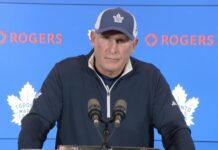


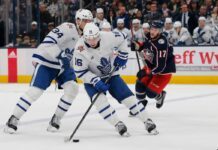




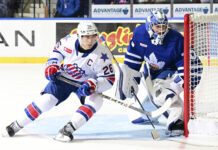






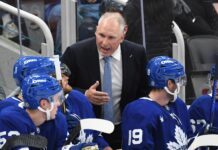


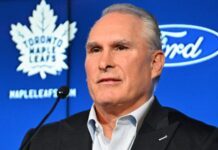
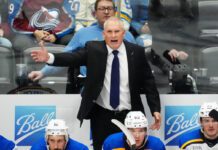
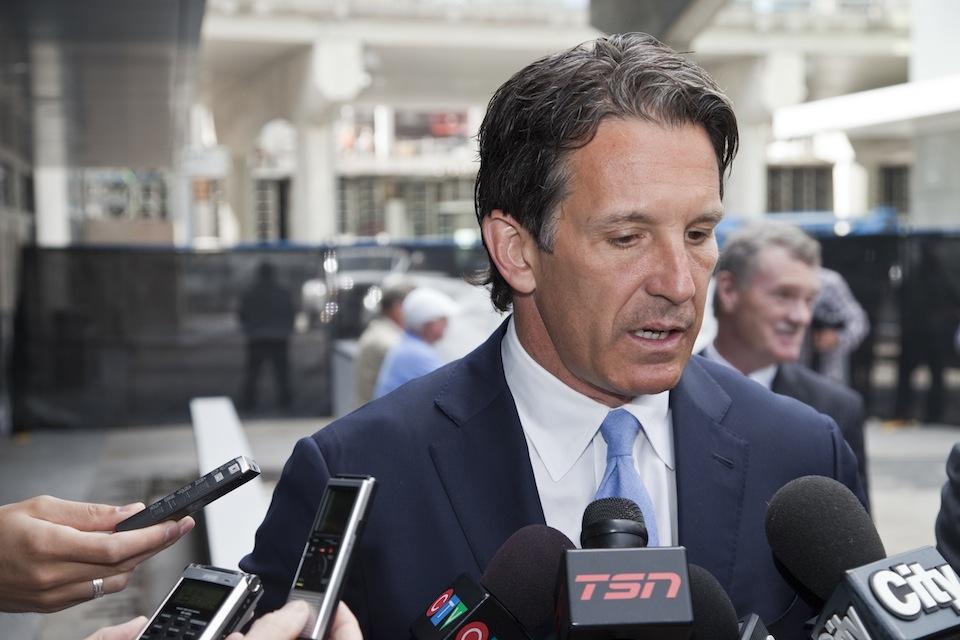
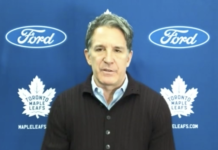


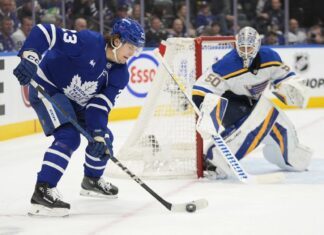
![Craig Berube Post Game, Blues 5 vs. Leafs 1: “We gave them three goals… The [3-1] goal was lazy hockey” Craig Berube, Toronto Maple Leafs head coach](https://mapleleafshotstove.com/wp-content/uploads/2024/10/berube-craig-lak-pg-100x70.jpg)






![Craig Berube Post Game, Leafs 5 vs. Lightning 2: “[Stolarz] is a quality, quality goalie… He’s been excellent for us” Craig Berube, Toronto Maple Leafs head coach](https://mapleleafshotstove.com/wp-content/uploads/2024/09/berube-pg-tor-100x70.jpg)
